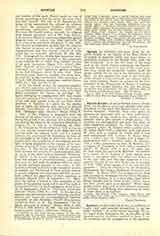

Apostle (in LITURGY), the name given by the Greek Church to the Epistle of the Mass, which is invariably of Apostolic origin and never taken, as sometimes happens in the Roman Rite, from the Old Testament. It is also the name of the book used in the Greek Church containing the Epistles for each Sunday and feast day of the whole year, and from which the anagnostes (reader) reads the proper Epistle for the day in the celebration of the Mass. As now printed and used in the Orthodox Greek Church in Constantinople and Athens, and in the Greek Catholic Church (as printed by the Congregation of the Propaganda at Rome), it contains not only the proper Epistles, but also the proper antiphons and prokeimena for the different days of the Greek ecclesiastical year. (See Epistle.)
ANDREW J. SHIPMAN

